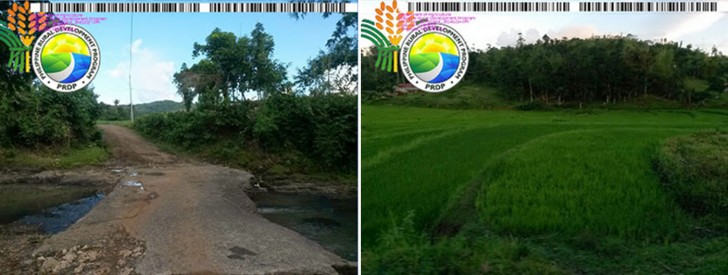 Geotagged photos of the portions of the Farm-Market-Road (FMR) and production area in Passi City, Iloilo recently approved by the World Bank for commencement. The 28-kilometer FMR sub-project worth P257.8-million will benefit at least 4, 000 dwellers in the area particularly rice, corn, and sugarcane farmers.
Geotagged photos of the portions of the Farm-Market-Road (FMR) and production area in Passi City, Iloilo recently approved by the World Bank for commencement. The 28-kilometer FMR sub-project worth P257.8-million will benefit at least 4, 000 dwellers in the area particularly rice, corn, and sugarcane farmers. World Bank Approves P257-M FMR Rehabilitation Project in Visayas
Farmers in Passi City, Iloilo now have a chance for better incomes and improved lives after the World Bank (WB) has issued the No-Objection Letter 2 (NOL2) for the construction of currently the biggest Infrastructure Development project under the Department of Agriculture’s Philippine Rural Development Project (DA-PRDP) in Visayas.
NOL 2 is issued to sub-projects that are approved for implementation. Prior to this, an initial NOL is issued that secures the funding of a particular sub-project. Infrastructure projects amounting to above US$5 million (approx P225.8 million) are subject to WB review.
The WB has issued last week the NOL 2 allowing the commencement of the rehabilitation of the 28-kilometer Imbang Grande-Tagubong-Gemumua-Agahon-Agtabo Farm-to-Market Road (FMR) in Iloilo amounting to P257.8 million (M).
The rehabilitation of the FMR is a counterpart initiative between the DA-PRDP and the Local Government unit (LGU), of which PRDP will finance 90% of the total project cost while the LGU will provide the remaining 10% funding.
In a letter addressed to PRDP Project Director and DA Undersecretary Emerson Palad, WB Task Team Leader for PRDP Carolina Geron has requested the DA to ensure the tight monitoring of the project implementation.
“Ensure that all construction and quality control equipment must be geotagged and key personnel must be mobilized within one month from the issuance of Notice to Proceed,” Geron said.
She also said that the contractor must submit to the Iloilo Provincial Local Government the geotagged photos of the sub-project showing progress prior to the construction and the subsequent months until project completion.
Palad explained that geotagging, which is one of the project monitoring tools highlighted by the PRDP, has played a vital role from the project proposals to actual implementation.
“We can be assured the project is really being implemented and that contractor and the LGU are following the quality standards we have set under the PRDP.”
“The Infrastructure Development (I-BUILD) component of the PRDP aims to develop a strategic network of climate-resilient rural infrastructures and facilities that will support the commodity value chain in project areas,” added Palad.
The FMR will support mainly the production and marketing of swine, rice, sugarcane and corn of farmers in 51 barangays as a result of the road rehabilitation, but Palad added that the entire agriculture industry in the area can benefit in the project, as well as the 4,000 dwellers around the road area.
“FMRs will not only help spur the development of the agriculture industry but can spur other economic activities as well and improve the overall economy in the rural areas,” said Palad.
Presently, 124 sub-projects worth P5.9 billion under the I-BUILD component have been approved for PRDP funding.
The PRDP is a six-year national project that aims to establish a modern, inclusive, value-chain oriented, and climate resilient agriculture and fisheries sector. It is implemented through the partnership of the DA, World Bank and LGUs. (Catherine Nanta, DA-PRDP)
